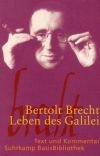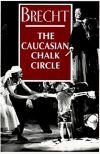
Life of Galileo, also known as Galileo, is a play by the twentieth-century German dramatist Bertolt Brecht with incidental music by Hanns Eisler. The second version was written between 1945–1947, in collaboration with Charles Laughton. The play received its first theatrical production at the Zurich Schauspielhaus, …

Mother Courage and Her Children is a play written in 1939 by the German dramatist and poet Bertolt Brecht with significant contributions from Margarete Steffin. After four theatrical productions in Switzerland and Germany from 1941 to 1952—the last three supervised and/or directed by Brecht—the play was filmed several …

The Good Person of Szechwan is a play written by the German theatre practitioner Bertolt Brecht, in collaboration with Margarete Steffin and Ruth Berlau. The play was begun in 1938 but not completed until 1943, while the author was in exile in the United States. It was first performed in 1943 at the Zürich …

Laser og pjalter er et musikteaterstykke med tekst af Bertolt Brecht og musik af Kurt Weill, der havde urpremiere 31. august 1928 i Berlin. Stykket kaldes også undertiden Tolvskillingsoperaen. Stykket er baseret på den engelske satiriske Tiggeroperaen af John Gay fra det 18. århundrede. I Brechts udgave fik stykket et …

Presents a fable which uses the ancient Chinese tale of the test of the chalk circle to illuminate the author's vision of an alterable present and the hope of a future golden age

Translated by Desmond I Vesey. Verses Translated by Christopher Isherwood. Ex-library Sticker on the Front..Softback,Ex-Library,with usual stamps markings, ,in fair to good all-round condition, ,365pages.

Bertolt Brecht Translated by George Tabori Drama Characters: 30 male, 5 female Brecht's shudderingly accurate parallel between Hitler and his henchmen on the one hand and the old crime lords of Chicago on the other is a vigorous eye opener that was produced on Broadway with Christopher Plummer. The Cauliflower …

Bertolt Brecht's Stories of Mr. Keuner is a collection of fables, aphorisms, and comments on politics, everyday life, and exile. From 1930 til his death in 1956, Brecht penned these ironic portraits of his times as he was "changing countries more often than shoes." An ardent antifascist, Brecht roamed across Europe …

 English
English Español
Español Deutsch
Deutsch

